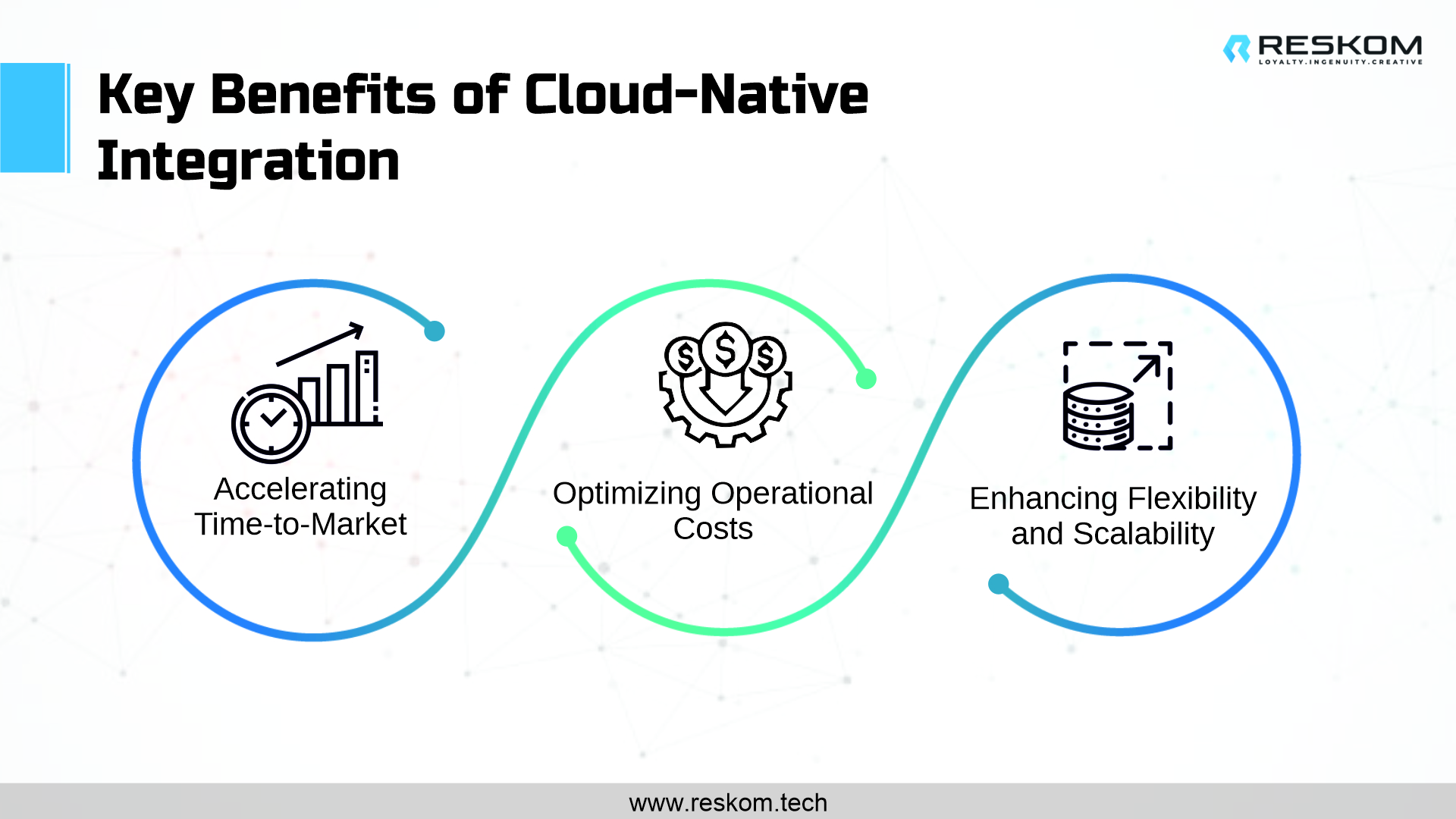The concept of integration has evolved from being a mere technical necessity to a strategic imperative. As organizations increasingly adopt cloud environments, the demand for integration solutions that align seamlessly with the cloud-native ethos has grown significantly.

Understanding Cloud-Native Integration
Cloud-native integration represents a paradigm shift from the traditional integration methods that were built for on-premises environments. It’s an approach that embraces the cloud’s inherent characteristics, such as scalability, flexibility, and agility, to create a dynamic and harmonious ecosystem of applications and data. Unlike the rigid architectures of the past, cloud-native integration is designed to seamlessly adapt to changing demands, making it an ideal fit for the fluid nature of modern business operations.
At its core, cloud-native integration is characterized by principles such as modularity, microservices, and containerization. These principles collectively enable applications to be broken down into smaller, reusable components that can communicate and interact independently. This architecture facilitates rapid development, deployment, and scaling, giving businesses a competitive edge in today’s fast-paced environment.
Exploring Cloud-Native Security Integration
In an era where data breaches and cyber threats are ever-looming, security is a paramount concern for businesses operating in the cloud. Cloud-native security integration addresses these concerns by embedding security measures directly into the integration process. This ensures that data remains secure throughout its journey from source to target.
Cloud-native security integration involves leveraging tools and techniques that provide real-time threat detection, encryption, and access control. By integrating security measures directly into the integration pipelines, organizations can safeguard sensitive information and ensure compliance with data protection regulations.
Embracing Cloud-Native Applications
Cloud-native integration goes hand in hand with the development of cloud-native applications. These applications are designed from the ground up to harness the full potential of cloud environments. They embrace principles such as microservices architecture, containerization, and auto-scaling, enabling organizations to build, deploy, and manage applications with unprecedented speed and efficiency.
Cloud-native applications are highly modular, meaning they consist of smaller, independently deployable components. This modularity allows for faster development cycles, enabling organizations to deliver new features and updates to users in real-time. Additionally, cloud-native applications are inherently scalable, adapting to fluctuating user demands without the need for manual intervention.
Cloud-Native Integration Solutions
A variety of cloud-native integration solutions have emerged to address the unique challenges of integrating applications in cloud environments. These solutions often leverage technologies, such as API management, microservices orchestration, and serverless computing.
Integration platforms that offer cloud-native capabilities enable organizations to seamlessly connect applications, systems, and data sources across different cloud providers and on-premises environments. These platforms provide visual interfaces that allow for easy design and deployment of integration workflows, reducing the need for extensive coding.
Key Benefits of Cloud-Native Integration
As organizations navigate the intricate pathways of modern business, the adoption of cloud-native integration emerges as a beacon of transformation. Beyond its technical intricacies, this approach offers an array of benefits that resonate profoundly with the dynamic demands of today’s business landscape. Let’s delve deeper into these benefits, unraveling how cloud-native integration aligns seamlessly with the intricacies of the modern business environment.
1. Accelerating Time-to-Market
In the fiercely competitive business landscape, the window of opportunity for introducing new products, services, or features is often fleeting. This is where cloud-native integration shines. By embracing cloud-native integration solutions, organizations gain the ability to expedite the development and deployment of new features and innovations. The modular architecture of cloud-native applications, coupled with the streamlined integration processes, allows businesses to pivot swiftly in response to market demands and emerging opportunities.
Consider a scenario where an e-commerce company is launching a new product line to capitalize on a trending market. Cloud-native integration enables the rapid connection of various applications and systems required for efficient order processing, inventory management, and customer interactions. This agility not only ensures timely product launches, but also positions the business at the forefront of customer satisfaction.
2. Optimizing Operational Costs
Operational efficiency and cost optimization have become paramount concerns for businesses of all sizes. Traditional integration approaches often resulted in overprovisioning of resources, leading to wastage and inefficiencies. The modular nature of cloud-native applications and integration workflows dismantles these inefficiencies, allowing organizations to align resources with the actual demand.
Cloud-native integration empowers businesses to scale resources up or down, dynamically based on real-time usage patterns. As a result, the need for excessive resources is mitigated, and costs are optimized. Consider a seasonal retail business that experiences varying levels of web traffic throughout the year. With cloud-native integration, the business can scale its application resources during peak shopping seasons and scale down during quieter periods. This elasticity translates to cost savings and improved resource utilization.
3. Enhancing Flexibility and Scalability
The modern business landscape is characterized by unpredictability and volatility. Cloud-native integration equips organizations with the flexibility and scalability required to navigate these challenges successfully. The modular architecture of cloud-native applications enable the swift addition or removal of components as needed. Whether it’s accommodating a sudden surge in user traffic or adapting to changing market conditions, cloud-native integration provides the agility to respond promptly.
Consider a financial services provider that experiences a surge in online transactions during market volatility. Cloud-native integration allows the business to seamlessly scale its transaction processing capabilities to meet the increased demand. This adaptability ensures uninterrupted services and enhances customer satisfaction, even in the face of unforeseen events.
Empowering Innovation
Innovation has become a hallmark of successful businesses, enabling them to differentiate themselves in crowded markets. Cloud-native integration sets the stage for innovation by removing the technical barriers that often hinder creative endeavors. The modular nature of cloud-native applications encourages experimentation and iteration, allowing businesses to introduce new features and functionalities without disrupting the entire ecosystem.
Consider a software company that wishes to experiment with a new payment gateway integration to offer customers more diverse payment options. With cloud-native integration, the company can quickly build, test, and deploy the integration, gaining valuable insights and feedback from users. This environment of experimentation not only fosters innovation but also positions the business as a responsive player in the market.
Conclusion
In a digital landscape characterized by rapid change and innovation, cloud-native integration emerges as a critical enabler of business success. It’s more than just a technical strategy; it’s a mindset that leverages the capabilities of the cloud to create agile, efficient, and scalable ecosystems. By embracing cloud-native integration, businesses can seamlessly connect applications, optimize operations, and drive innovation. As the technology landscape continues to evolve, organizations that harness the potential of cloud-native integration will be better equipped to navigate the challenges and opportunities that lie ahead.
Elevate your business operations with the transformative power of cloud-native integration. At Reskom, we specialize in guiding organizations toward seamless integration, operational excellence, and innovation through cloud-native strategies. Our expert team is here to help you harness the full potential of cloud-native integration for your unique needs.


